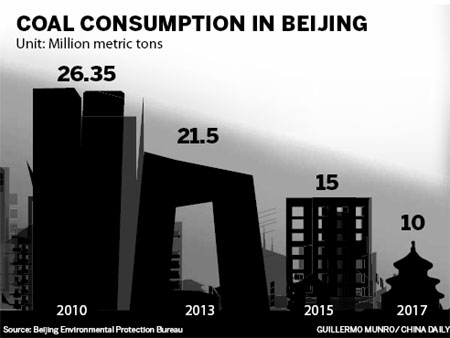Beijing aims to slash coal use
 0 Comment(s)
0 Comment(s) Print
Print E-mail China Daily, September 3, 2013
E-mail China Daily, September 3, 2013
The Beijing municipal government has vowed to slash the capital's consumption of coal by more than 50 percent over five years based on 2012 levels, according to a clean-air action plan issued on Monday.
With the plan, local government is aiming to reduce the proportion of coal used within the city's total energy mix to below 10 percent. Pollution from coal-fired emissions is a major contributor to Beijing's smog, especially during the winter.
 |
The municipal government has been cutting down on coal consumption for 14 years, according to China Environmental News, which is run by the Environmental Protection Ministry. Within that time frame, according to the publication, Beijing has slashed 7 million tons from its total coal consumption.
The plan issued on Monday lists a number of coal-cutting measures, including allocating a coal quota to districts and key users, strengthening the capital's gas and electricity supply and revising a sulfur concentration standard in coal.
By reducing its coal consumption, the government says it will increase the demand for natural gas supply to 24 billion cubic meters by 2017, a goal the government said it will meet.
"The supply of natural gas within and outside China is promising since more natural gas reserves have recently been discovered," said Zhou Dadi, vice-chairman of China Energy Research Society.
Four gas-based power plants will begin operations in Beijing by 2014. It has been estimated that they will cut the use of coal by about 9.2 million tons.
Another measure within the plan calls for replacing low-quality coal usually used in rural and suburban areas with high-quality coal that is low in sulfur content before the 2016 heating season begins.
"These areas use about 4 million tons of coal every year, accounting for less than 20 percent of the city's total consumption. Yet because of the coal's low quality, the sulfur dioxide generated amounts to more than 70 percent of the total emissions," said Wang Jian, deputy head of the pollution prevention and control department of the Environmental Protection Ministry.
Wang said all low quality coal will be phased out in 2016.
Beijing is also trying to completely eliminate the use of coal within the Second Ring Road, the core area of the city, an aim first established in 2001. So far, about 200,000 households had switched from coal to electricity by the end of last year. The plan issued on Monday said by the end of 2015, the remaining 65,000 households within the area will begin using electricity for their winter heating.





